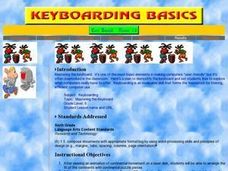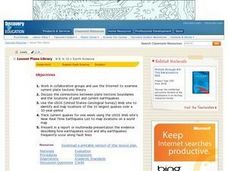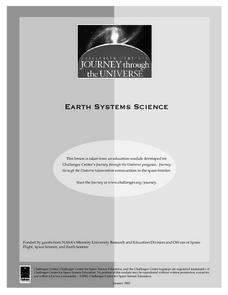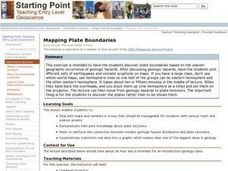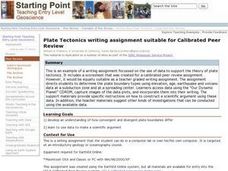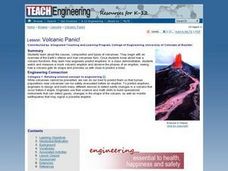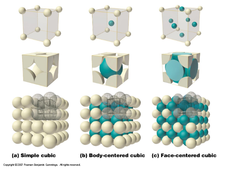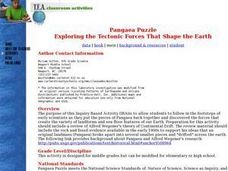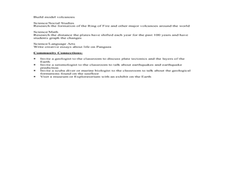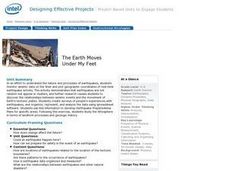Curated OER
Forces That Shape the Earth: Plate Movement
In this tectonic plate instructional activity, students learn about the movement of the plates that make up the earth's crust. They read about the Theory of Pangaea, lithosphere, divergence, convergence, and plate transformation....
Curated OER
Predicting Plate Movement
In this plate movement learning exercise, students review the 3 types of plate boundaries and predict where plates will be as they continue moving along their current path. This learning exercise has 2 short answer questions.
Curated OER
Plate Tectonics
In this science worksheet, students use basic scientific concepts to complete the series of puzzles that are intended to increase science literacy and focusing upon plate tectonics.
Curated OER
Mastering the Keyboard
Sixth graders view an animated program showing how the continents fit together millions of years ago. In groups, they compare and contrast the distribution of rocks and fossils based on how the continents fit together. After reading a...
Curated OER
Earthquakes And Fault Lines
Students discuss major causes of earthquakes and identify famous fault lines, access and map information about ten largest earthquakes in world from 1989 to 1998, and theorize about location of these earthquakes as they relate to Earth's...
Curated OER
Continents on the Move
Students examine the tectonic plates of the Earth and how the landforms of Earth have changed position over time. In groups, they identify the evidence that the continents are still moving. To end the activity, they practice measuring...
Curated OER
Layers of the Earth: Plate Tectonics
Sixth graders participate in a lesson that is about investigating the different layers of the earth and defining how the plates move over the mantle. They engage in a variety of activities and use mathematics to create projects to...
Curated OER
Plate Tectonics: Movin' and Shakin'
Students are introduced to the causes of plate movements and the hazards they present. They plot the location of 50 earthquakes and 50 volcanic eruptions on a map and explore the relationships between plate tectonics, earthquakes, and...
Curated OER
Our Changing View of the Earth
Students explore the theory of Plate Tectonics. They participate in a simulation in which they re-enact the debate over Plate Tectonics vs. traditional beliefs of stationary continents that were widely accepted during the 1800's and...
Curated OER
Tectonic Plates, Earthquakes, and Volcanoes
Challenge geography classes to locate the major volcanoes and earthquake faults on a world map. In groups, they identify the pattern made and examine the relationship between the locations of the faults and volcanoes and tectonic plates....
Curated OER
Stressed to a Fault!
Eighth graders describe how stress builds up in the Earth's crust by the movement of tectonic plates. In groups, they relate the three types of stresses to the types of plate movements and explain how the stress causes faults to form. ...
Curated OER
Mapping Plate Boundaries
Students discover plate boundaries based on the uneven geographic occurrence of geologic hazards. After discussing geologic hazards, students plot different sets of earthquakes and volcanic eruptions on maps.
Curated OER
Marine Environmental Geology
Students take this course as an introduction to the aspects of marine geology and oceanography that affect the environment and marine resources. Topics include estuarine oceanography and sediments, eutrophication of coastal waters,...
Curated OER
Plate Tectonics Writing Assignment
Students complete a writing assignment focused on the use of data to support the theory of plate tectonics. They access data using the "Our Dynamic Planet" CDROM, capture images of the data plots, and incorporate them into their writing. T
Curated OER
Volcanic Panic!
Students begin with an overview of the Earth's interior and how volcanoes form. They learn how engineers predict eruptions. In a class demonstration, students watch and measure a mock volcanic eruption and observe the phases of an...
Curated OER
Volcanoes
Students investigate the processes and characteristics of volcanoes. They watch real-life videos of volcanoes and identify the physical features and eruption types, create a notebook of volcano characteristics, and identify volcano...
Curated OER
Plate Tectonics
Students use lecture, maps and video to analyze the distribution of earthquakes and volcanoes. They relate this distribution to the theory of plate tectonics and conduct several experiments to illustrate the forces at work in this theory.
Curated OER
Get Ready to Rumble
Students use the Internet to examine earthquakes. They discover the theory of tectonic plates and analyze faults throughout the world. They also examine the science of seismology to explain how earthquakes are measured.
Curated OER
Pangaea Puzzle: Exploring the Tectonic Forces That Shape the Earth
Sixth graders follow in the footsteps of early scientists as they put the pieces of Pangaea back together and discovered the forces that create the variety of landforms and sea-floor features of our Earth.
Curated OER
The Volcano Factory
Students examine the process of tectonic plates and why the Mariana Arc is active with volcanoes. They create a model of the Mariana Arc out of clay.
Curated OER
Friendly Volcanoes
Students discuss the benefits of volcanic activity on marine life. They explain the process of tectonic plates.
Curated OER
Under My Feet
Fifth graders investigate the layers of the Earth, origin of tectonic plates and what happens when plates collide. They watch a video and use clay to demonstrate the different types of plate movement.
Curated OER
The Earth Moves Under My Feet
Students study earthquakes, monitor seismic activity using the Web, and plot real-time activity. They examine movement of the Earth's tectonic plates. They create an earthquake preparedness project.
Curated OER
Floating Plates on the Earth
Fourth graders construct a concept map about Plate Tectonics. They include types of movement, names and effects of boundaries. They research plate tectonics, describe and name 3 types. They analyze the effect on the earth's surface of...





